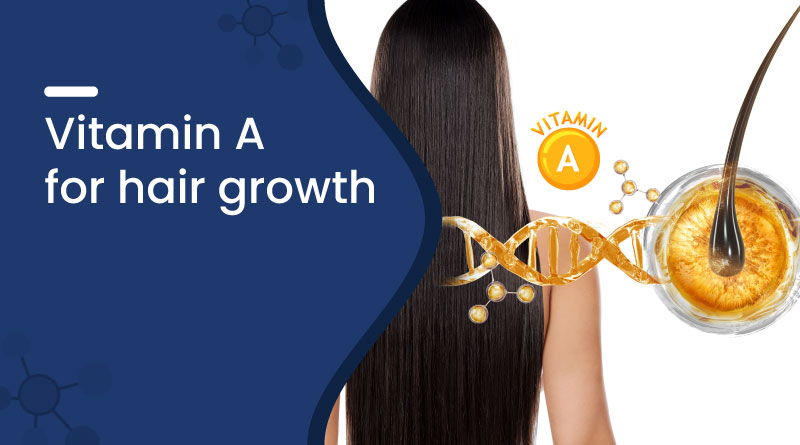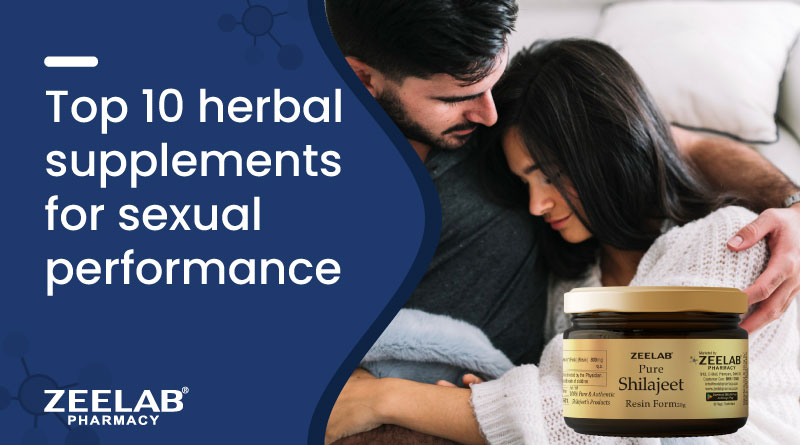Vitamin A for Hair Growth – Benefits, Sources & How to Use


Healthy and shiny hair makes a person look more appealing and charismatic. Hair growth depends on various aspects like genetics, hormonal balance, nutritional intake, and lifestyle. Among all the nutrients, Vitamin A is considered important as it directly supports cell growth and scalp health—both are keys to healthy hair. Through this blog, you will learn how Vitamin A helps in hair growth, its sources, and more.
How Does Vitamin A Work for Hair Growth?
Vitamin A is a fat-soluble vitamin known for supporting vision, immunity, and cell regeneration. When it comes to hair, its most important role lies in stimulating the production of sebum, the natural oil that moisturizes the scalp. A well-hydrated scalp provides a fertile environment for hair follicles, encouraging healthier and faster hair growth.
Skin and hair, which are made up of epithelial cells, rely on Vitamin A for proper growth and function. It helps in the development of the cells that produce keratin, an essential structural protein in hair. Vitamin A ensures that new, healthy hair can replace old or damaged strands efficiently.
Key Advantages of Vitamin A for Your Hair
- Stimulates Natural Oil Production: Keeps the scalp moisturized, preventing dryness and flaking.
- Promotes Cell Growth: Encourages faster regeneration of hair follicles and skin tissue.
- Strengthens Hair Strands: Improves the structure of hair, reducing breakage and split ends.
- Improves Scalp Health: A healthy scalp provides a better foundation for sustained hair growth.
- Boosts Blood Circulation: Helps deliver nutrients and oxygen to hair follicles more efficiently.
Best Vitamin A Products for Hair at Zeelab
Zeelab provides the best solutions for your problems at a reasonable price. The Zeelab Hair, Skin, and Nails Tablet is an excellent supplement to get healthy hair.
| Product | Key Features |
|---|---|
| ZEELAB Hair, Skin, and Nails Tablet | It has multiple essential nutrients and promotes the growth of healthy, shiny, and stronger hair. |
Signs of Vitamin A Deficiency in Your Hair
When the body lacks Vitamin A, the scalp can become irritated and scaly, often resulting in dandruff and weakening of the hair. Hair follicles require proper nutrition and moisture to stay active, and when these requirements are not met, it can lead to temporary hair loss.
Vitamin A deficiency can also slow down cell regeneration and weaken the hair shaft, leading to fragile strands and breakage. Individuals experiencing sudden hair thinning or dryness might want to evaluate their vitamin intake, particularly Vitamin A.
Can Excess Vitamin A Cause Side Effects on Hair?
While Vitamin A is crucial for hair health, too much of it can do more harm than good. Excess intake, especially through high-dose supplements, may disrupt the natural hair growth cycle and lead to hair thinning or loss. Some key side effects on hair include:
- Increased Hair Shedding: High Vitamin A levels can push hair follicles into the shedding (telogen) phase prematurely.
- Weakened Hair Roots: Overconsumption may cause inflammation in hair follicles, weakening the roots.
- Dry and Itchy Scalp: Similar to deficiency, excess Vitamin A can disrupt the natural oil production of the scalp and make it dry and itchy.
- Overall Hair Thinning: Prolonged excess intake can result in noticeable volume loss over time.
That’s why it is essential to stay within the recommended daily intake and avoid high-dose supplements without consulting a doctor.
Sources of Vitamin A
Vitamin A is available in two main forms: preformed Vitamin A, found in animal-derived foods, and provitamin A, which comes from plant-based sources. Here are some rich sources of Vitamin A:
- Animal-based (Retinol): Liver, eggs, butter, cheese, and fortified dairy products.
- Plant-based (Beta-carotene): Carrots, sweet potatoes, spinach, kale, pumpkin, and mangoes.
Eating a balanced mix of both forms helps maintain ideal levels without risking toxicity.
How to Include Vitamin A in a Haircare Routine
The best way to support your hair with Vitamin A is through a healthy diet. Eat foods like carrots, spinach, sweet potatoes, eggs, and dairy regularly. You can also try gentle scalp massages to boost circulation. While some people use Vitamin A creams or oils, these should be used carefully, as too much can cause dryness or irritation. Always start slow and monitor how your scalp reacts.
Conclusion
Vitamin A plays an integral role in supporting hair growth by maintaining scalp health, encouraging cell turnover, and nourishing hair follicles. However, like most things in health and nutrition, balance is key. Both deficiency and excess can negatively impact your hair. By incorporating natural food sources and consulting with a healthcare provider before starting supplements, you can safely support your hair’s health and vitality from within.
Frequently Asked Questions (FAQs)
Q. Does Vitamin A help in hair growth?
A. Yes, Vitamin A supports healthy hair growth by keeping the scalp moisturized and aiding in cell turnover, which helps nourish hair follicles and promote stronger strands.
Q. How much time does it usually take to see outcomes?
A. To get visible results, it typically takes around 2–3 months of regular use.
Q. Can I take Vitamin A supplements for healthy hair?
A. Yes, you can. Vitamin A directly supports the growth of healthy and shiny hair.
Q. Which foods are rich in Vitamin A?
A. Vitamin A is found in several animal-based foods (liver, fish, and dairy products) and plant-based foods (carrots, sweet potatoes, green leafy vegetables, and more).
Recent Blogs
Disclaimer : Zeelab Pharmacy provides health information for knowledge only. Do not self-medicate. Always consult a qualified doctor before starting, stopping, or changing any medicine or treatment.
















 Added!
Added!